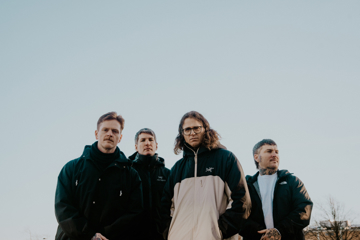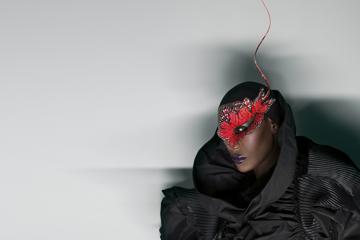Bombaystic Sounds
"The skipper is this slightly corrupt Love Boat captain," says Andy Williamson of his role/character in Bombay Royale. "He’s more decadent than evil, really."

The best thing about Bollywood films is everything. The music, the dancing, the cheesiness, the colours, the cheapness, the lavishness, the lack of tongue bashing, the clichéd storylines, the amazing cultural clashes, the sheer bizarreness, and the cultural uniqueness. Because lets face it, no other culture could do what they do. The music is incredible, often a unique fusion of Indian instruments and traditions alongside the blatant theft of prevailing western genres, and more often than not the very riffs of popular songs. Whilst many of the soundtracks these days utilise the highly popular Bhangra dance music, there was a golden period of Bollywood film music in the '60s and '70s when names like RD Burman and Ghulam Haider reigned supreme, dropping one amazing genre-defining soundtrack after another.
“You'll actually find that even if the rest of the film is pretty bad, often the production value and the effort and the thought will still go into the compositions and the dance stuff,” offers Andy Williamson, founder of Melbourne Bollywood ensemble The Bombay Royale. “It can go from really high production values in those sections of the films through to just a one-camera nonsensical dialogue scene that's just been shot in a single take.”
But it's the music that attracted Williamson; in particular the masterful composers like Burman and Haider. “There seemed to be more license for composers at that time, both in India and in the West. There seemed to be more composers who could make musical statements in films,” he offers. “The more I researched, I had this growing awareness of this old cinematic stuff, Bollywood movies from the '60s and '70s. Fantastic soundtracks and no one was really performing it live. So initially I wanted to be in a band playing this stuff live. I just thought it would sound awesome because it's this mash up of Indian styles and Western cinematic influences as well which are really fun as a musician.”
Williamson has played in bands around town for years, though it was lure of the exotic, the kitsch, the strange arrangements, the melange of styles and big horns and general wildness of Indian film music that reeled him in. “It was all covers initially,” he concedes, “and I charted out about twenty five or thirty tunes for a full band. So I wrote everything out because it's very detailed. It's not the kind of music that you could jam out week after week and get it happening. You really need that kind of structure there.
Don't miss a beat with our FREE daily newsletter
“Initially it was something that I got happening that popped out of my imagination,” he continues, “but as its progressed others have taken a lot more ownership of it. Then we started writing a lot more.”
The result of this work is their debut LP, You Me Bullets Love, a modern take on the golden era, a faux soundtrack to a fantastical Bollywood romp, where surf guitar melds into jazz, exotica, funk, Go-Go and rockabilly, with searing synth injections and of course the more traditional sitar, mandolin and tabla. It's wild; a musical rollercoaster that not just evokes the madness of a Bollywood soundtrack but updates it for a modern audience. This may be in part due to the fact that eight of the ten tracks were penned by the band themselves, though it's also due to the production, which was handled by Tristan Ludowyk, Hope Street label boss and member of Melbourne afrobeat purveyors Public Opinion Afro Orchestra.
“The thing that we have in common is that when recording we're trying to capture a gritty live sound you hear on '60s and '70s recordings,” offers Williamson thoughtfully. “And that grittiness and vibe often gets bleached out with digital recordings and some of the modern techniques. So it's actually been a ten-year learning curve to figure out how to capture that. So when it came to recording it there wasn't really anyone else.
“It's gotta stand up, and that's one of the things with the old Bollywood stuff that suffers, because the recordings were pretty brutal and you put them alongside modern recordings and they sound pretty crazy. You don't want it to sound exactly like it was recorded in 1963 because a modern audience isn't going to be quite on the same page. If you put it on the radio it will sound very thin and a bit strange. On the other hand, if you do it digitally, it sounds really white and boring.”
Live Bombay Royale are an assault on the senses, an 11-piece ensemble with stinging brass, ultra funky basslines, sleazy keys and tabla. They're also regaled in full Bollywood attire… In short, they look like they've stepped straight out of an Indiana Jones film. Then of course there's Williamson decked out in an all white naval uniform as the skipper.
“There are a few skippers in different films,” he reveals. “In Bollywood films there's always officials or crazy chiefs of police or naval officers. There's always someone in a uniform calling the shots. My Dad was a real ship's captain. That wasn't conscious but maybe there's some Freudian thing going on there. The skipper is this slightly corrupt Love Boat captain. If I put him in a full military outfit it would've been a bit too heavy and a bit too wrong, but in a white sailors outfit he's got a little decadence to him. He's more decadent than evil, really.
“We're trying to create this fantasy with the music,“ he continues. “You set up this crazy psychedelic soundscape and people don't want to hear you then go 'Oh G'day, it's good to see you all here'. Without making it too theatrical or scripted, we realised that we kind of had to maintain the characters so that the music is kept in that space. It kept the fantasy going for people, so as that became more evident the characters all became stronger and tended to evolve as well.”
Williamson sees Bombay Royale as being part of the tradition of Bollywood music. It was music maintaining its traditions yet drawing influence from the West. Williamson casts the net back the other way. “I see us as having a conversation with that genre,” he laughs, “but we're mostly from an Australian background other than the singers, who are from an Indian background. We're a Melbourne band and it's our take on it and we're having a conversation with it and using it as a springboard to create songs and music of our own.”







